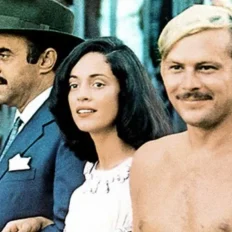
Audiovisual
CCVM hosts traveling exhibition and exhibition The Cinemateca is Brazilian
27 February to 08 March 2024
Since last year, the Cinemateca Brasileira has toured the country with the traveling exhibition CINEMATECA É BRASILEIRA, with the objective of strengthening ties with related institutions and presenting part of the rich Brazilian audiovisual production, including a selection of important titles in the history of Brazilian cinema and an exhibition. In São Luís, eight titles from the exhibition will be screened in free sessions at the Vale Maranhão Cultural Center, from February 27 to March 08. It is part of the event in São Luís, an exhibition that tells the history of the Cinemateca Brasileira and a program of
movies scheduled for public school high school students.
The first season of the traveling exhibition has already taken place in Curitiba, Belo Horizonte, Vitória, Vila Velha, Rio de Janeiro, Porto Alegre, João Pessoa, Recife, Fortaleza, Brumadinho and Canaã dos Carajás, and will also visit cultural spaces and venues in Salvador (BA) and Belém (PA). “The Vale Cultural Institute is on the side of Cinemateca because it understands the importance of the production house
Brazilian audiovisual, one of the largest institutions of its kind in the world, which also preserves a portrait of our own identity. For this reason, we work together in initiatives for the sustainability and modernization of the space and for the safeguarding of its collection, especially the priceless collection of cellulose nitrate films,” says Hugo Barreto, CEO of the Vale Cultural Institute, which is a strategic sponsor of the Cinemateca Brasileira.
The event is part of the Viva Cinemateca Project, launched in June, which brings together Cinemateca’s major projects aimed at recovering important collections, in addition to the modernization of its headquarters and technical infrastructure. “With the constant commitment to transform lives, we understand that the promotion of culture is fundamental
as a bridge for development and citizenship. The role that Cinemateca plays in the construction, strengthening and memory of Brazilian audiovisual is invaluable and being able to contribute to a project like this is our legacy of partnership with Brazilian society”, comments Glauco Paiva, Executive Manager of Communication and Social Responsibility at Shell Brazil, master sponsor of the Viva Cinemateca project.
FILM CURATORSHIP
For the Mostra, the Cinemateca Brasileira curator prepared a selection of eight films that cover different historical moments, aesthetic proposals and thematic approaches, demonstrating the richness of Brazilian cinema over more than 120 years of history.
From the early days of Brazilian cinema, there is São Paulo: the symphony of the metropolis (Rodolfo Lustig and Adalberto Kemeny 1929), which summarizes their vocation for documentaries. The desire to establish a film industry in Brazil, which culminated in the founding of the Atlântida and Vera Cruz studios, can be seen in Jeca Tatu (Milton Amaral, 1959), the title in which Amácio Mazzaropi developed the figure of the caipira,
his best-known character.
Based on a classic narrative improved since the Vera Cruz productions, The Payer of Promises (Anselmo Duarte, 1962), evokes religious syncretism and popular culture. Produced by Oswaldo Massaini, the film won the only Palme d’Or at the Cannes Film Festival for Brazil. In turn, with your
independent productions, José Mojica Marins creates his iconic character Zé do Caixão in At Midnight I’ll Take Your Soul (1964). With The Red Light Bandit (1968), Rogério Sganzerla challenges the aesthetics and language of the new cinema movement and, in the following decade, director Bruno Barreto adapted a great author — Jorge Amado — and did impressive box office numbers with Dona Flor and Her Two Husbands (1979). Central do Brasil (Walter Salles, 1998) won the Golden Bear and the Best Actress award for Fernanda Montenegro at the 1998 Berlin Film Festival, one of the most important works of revived Brazilian cinema in the 1990s. Winner of dozens of national and international awards and
nominated for an Oscar in four categories, City of God (Fernando Meirelles and Katia Lund, 2002) is still the Brazilian film with the highest number of Academy Award nominations.
Schedule
27/02 – 19:00 – São Paulo – The symphony of the metropolis
28/02 – 19:00 – Dona Flor and her two Husbands
29/02 – 16:00 – The Red Light Bandit
01/03 – 19:00 – The Payer of Promessas
05/03 – 19:00 – Jeca Tatu
06/03 – 19:00 – At midnight I will take your soul
07/03 – 16:00 – City of God
08/03 – 19:00 – Central Brazil